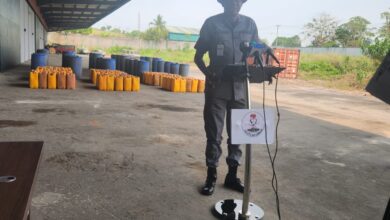

The Sea Empowerment and Research Center (SEREC) Head of Research, Dr. Eugene Nweke has said the 4% Free On Board value of imports as contained in the Part (5) , Section 18 of the Customs ACT 2023 will provide a stable source of revenue for the Nigeria Customs Service (NCS), while the provision for an increase allows for flexibility in response to changing economic conditions.
According to a press statement issued by Nweke, transparency and accountability in the determination of user fees and tariff regimes is also important, as it helps to promote stability and continuity in revenue generation and trade facilitation.
He added that the section provides that the NCS shall keep and maintain bank accounts into which shall be paid not less than 4% of the free-on-board (FOB) value of imports, among other revenues.
According to him, the customs authorities have imposed a 4% charge on the cost, insurance, and freight (CIF) value of imports instead of the FOB value and the approach is not most ideal in the face of Professional Practice for several reasons such as: international best practices, lack of transparency, unilateral Implementation.
He opins that in the light of this, the implications of the situation is significant, as many cargo undergoing duty payment and clearance processes are presently trapped across customs ports and it may lead to:delays and congestion at the ports, increased costs, loss of revenue and damage to industry reputation.
The SEREC H.O.R added that the situation is critical, as many cargoes are trapped across customs ports due to the uncertainty and confusion surrounding the 4% charge.
He advised that the customs authorities should take immediate action to address the situation by providing clarity on the implementation of the 4% charge, including the basis for calculation and the effective date, issuing a circular to inform importers and customs brokers of the changes to the customs regulations, and engaging with stakeholders, including importers, customs brokers, and freight forwarders, to address their concerns and provide guidance on the new regulations.
Nweke pointed that the NCS is yet to meet with the appropriate standard application or undergo thorough administrative due process nor in line with the international best practices, and his reason for saying so is that the circular provided by the service could not be rated in all standard as having judiciously gone through the requisite provisions of the section 18 of the customs act 2023 as no Presidential notifications to the National Assembly nor Presidential approval or consent could be referenced to in this regards, except if such process will be back dated and referenced over night.
“4% FCS is a legislated fee as enshrined in Part V, Section 18 of the Customs Act 2023 which provides a framework for financing the operations of the NCS. The
Customs 4% FOB Not in Line With International Standard -SEREC H.O.R, Nweke
The Sea Empowerment and Research Center (SEREC) H.O.R, Fwdr Eugene Nweke Rff has said the 4% FOB value of imports as contained in the Part (5) , Section 18 of the Customs ACT 2023 is not most ideal in the face of Professional Practice for several reasons such as: international best practices, lack of transparency, unilateral Implementation.
He opins that in the light of this, the implications of the situation is significant, as many cargoes undergoing duty payment and clearance processes are presently trapped across customs ports and it may lead to: delays and congestion at the ports, increased costs, loss of revenue and damage to industry reputation.
According to a press statement issued by Nweke, the NCS is yet to meet with the appropriate standard application or undergo thorough administrative due process in line with the international best practices, and his reason for saying this is that the circular provided by the service could not be rated in all standard as having judiciously gone through the requisite provisions of the section 18 of the customs act 2023 as no Presidential notifications to the National Assembly nor Presidential approval or consent could be referenced to in this regards, except if such process will be back dated and referenced over night.
The SEREC official added that the situation is critical, as many cargoes are trapped across customs ports due to the uncertainty and confusion surrounding the 4% charge.He advised that the customs authorities should take immediate action to address the situation by providing clarity on the implementation of the 4% charge, including the basis for calculation and the effective date, issuing a circular to inform importers and customs brokers of the changes to the customs regulations, and engaging with stakeholders, including importers, customs brokers, and freight forwarders, to address their concerns and provide guidance on the new regulations.
He stated stated that, it is business unfriendly for the NCS to implement 4% FCS fee along side the extant 1% CISS collection because, the FCS charge is meant to finance customs operations and cargo inspection is a component of its operations.
“The implications of these provisions are significant, as they affect the revenue generation and operations of the NCS, as well as the broader economy.
“The imposition of a 4% charge on CIF value instead of FOB value by customs is not ideal and professional. The unilateral implementation of the charge without proper notification and circular may lead to delays, congestion, and increased costs, ultimately damaging the reputation of the customs authorities and the industry as a whole. The customs authorities should take immediate action to address this situation and provide clarity on the implementation of the 4% charge.
“It must be stated that, it amounts to business unfriendly for the NCS to implement 4% FCS fee along side the extant 1% CISS collection because, the FCS charge is meant to finance customs operations and cargo inspection is a component of its operations.
“Therefore, collecting the 4% FCS charged on FOB for financing customs operation and at this same time collecting 1% CISS ( Comprehensive Inspection Service Scheme) charged on FOB for cargo inspection handling operation fee tantamounts to highandedness, in the context of the NCS and industry procedural code.
“Let me state without prejudice, other than, directing the area comptrollers to kick start stakeholders engagement, it is most administrative appropriate to firstly, suspend the collections of the fee, go back to drawing board and issues an implementation grace period for the collection of the 4% FCS fee across board. This to me squares up with due process and international best practices, thus, advancing the culture of responsible partnership between the Service and the Stakeholders, especially the trading public and the forwarders.
“Consequently, a serious unequal trade treatment has been committed, base on operational findings, while the implementation of the 4% fee has been integrated into the Apapa and Tincan command revenue assessment portals, it is same with the PTML command portal.
“This development, thus causing trade distrusts, distortions and disruptions in financial budgettings of the shippers, as it casts a heavy competition burden amongst the trading public who clears their shipments from customs ports to sell in a common market, one paying the 4% fees and the other not paying.
“With regards to the right and left customs 7C’s and 7C’s, I wish to urge the management to revisit it and attend to this trade policy concern with prompt sense of administrative diligence, as foreign investors and global stakeholders are watching with keen interests.”, he said.











